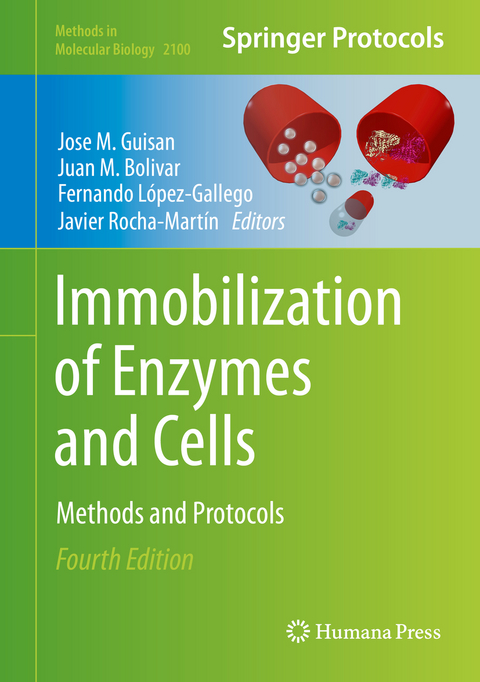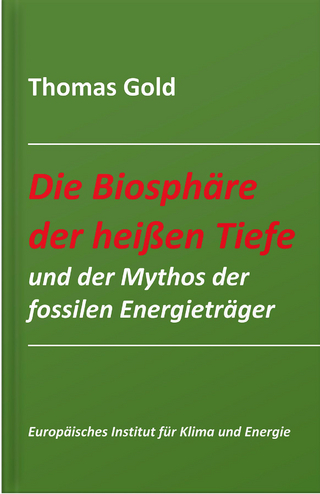
Immobilization of Enzymes and Cells
Springer-Verlag New York Inc.
978-1-0716-0214-0 (ISBN)
Cutting-edge and authoritative, Immobilization of Enzymes and Cells: Methods and Protocols, Fourth Edition is a valuable resource for researchers interested in expanding their knowledge of this developing field.
Overview of Immobilized Enzymes Applications in Pharmaceutical, Chemical, and Food Industry.- Parameters for the Evaluation of Immobilized Enzymes under Process Conditions.- One-Point Covalent Immobilization of Enzymes on Glyoxyl-Agarose with Minimal Physico-Chemical Modification: Immobilized “Native Enzymes”.- Multi-Point Covalent Immobilization of Enzymes on Glyoxyl-Agarose with Minimal Physico-Chemical Modification: Stabilization of Industrial Enzymes.- Multi-Potent Covalent Immobilization of Enzymes on Supports Activated with Epoxy Groups: Stabilization of Industrial Enzymes.- Immobilization of Enzymes on Supports Activated with Glutaraldehyde: A Very Simple Immobilization Protocol.- Very Strong but Reversible Immobilization of Enzymes on Supports Coated with Ionic Polymers.- Immobilization of Lipases by Adsorption on Hydrophobic Supports: Modulation of Enzyme Properties in Biotransformations in Anhydrous Media.- Immobilization of Enzymes on Hetero-Functional Supports: Physical Adsorption Plus Additional Covalent Immobilization.- Stabilization of Multimetic Enzymes via Immobilization and Further Cross-Linking with Aldehyde-Dextran.- Immobilization of Enzymes on Magnetic Beads through Affinity Interactions.- Immobilization of Proteins on Gold Surfaces.- Immobilization of Enzymes in Protein Films.- Encapsulation of Enzymes in Porous Capsules via particle Templating.- Enzyme Immobilization in Wall-Coated Flow Microreactors.- In Situ Immobilization of Enzymes in Biomimetic Silica.- Environmentally-Friendly Enzyme Immobilization onto MOF Materials.- Co-Immobilization and Co-Localization of Multi-Enzymes Systems on Porous Materials.- Single-Particle Kinetics of Immobilized Enzymes by Harnessing the Autofluorescence of Co-Immobilized Cofactors.- Intraparticle pH Sensing within Immobilized Enzymes: Immobilized Yellow Fluorescent Protein as Optical Sensor for Spatiotemporal Mapping of pH Inside Porous Particles.- Manufacturing of Protein-Based Biomaterials Coupling Cell-Free Protein Synthesis with Protein Immobilization.- Immobilization of Enzymes as Cross-Linked Enzyme Aggregates: General Strategy to Obtain Robust Biocatalysts.- NMR OF Immobilized Enzymes.- Whole Cell Entrapment Techniques.- Immobilization of INS1E Insulin-Producing Cells within Injectable Alginate Hydrogels.- Immobilization of Cells on Polyurethane Foam.- Covalent Immobilization of Microbial Cells on Microchannel Surfaces.- Immobilization of Cells by Magnetic Nanoparticles.- Cultivation of Productive Biofilms in Flow-Reactors and their Characterization by CLSM.- Immobilization of Microalgae.- Therapeutic Applications of Encapsulated Cells.
| Erscheinungsdatum | 27.01.2020 |
|---|---|
| Reihe/Serie | Methods in Molecular Biology ; 2100 |
| Zusatzinfo | 109 Illustrations, color; 89 Illustrations, black and white; XVI, 495 p. 198 illus., 109 illus. in color. |
| Verlagsort | New York, NY |
| Sprache | englisch |
| Maße | 178 x 254 mm |
| Themenwelt | Naturwissenschaften ► Biologie ► Biochemie |
| Naturwissenschaften ► Biologie ► Mikrobiologie / Immunologie | |
| Naturwissenschaften ► Biologie ► Zellbiologie | |
| ISBN-10 | 1-0716-0214-4 / 1071602144 |
| ISBN-13 | 978-1-0716-0214-0 / 9781071602140 |
| Zustand | Neuware |
| Informationen gemäß Produktsicherheitsverordnung (GPSR) | |
| Haben Sie eine Frage zum Produkt? |
aus dem Bereich


